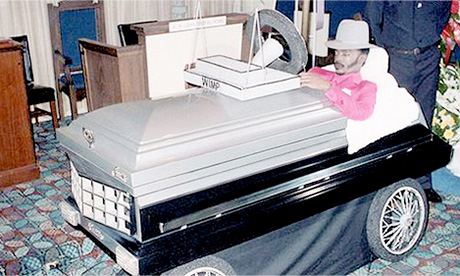Dayna West knows how to throw a fabulous memorial shindig.
She hired Los Angeles celebration-of-life planner Alison Bossert — yes, those now exist — to create what West dubbed “Memorialpalooza” for her father, Howard, in 2016 a few months after his death.
“None of us is going to get out of this alive,” says Bossert, who helms Final Bow Productions.
“We can’t control how or when we die, but we can say how we want to be remembered.”
And how Howard was remembered!
There was a crowd of more than 300 on the Sony Pictures Studios. A hot-dog cart from the famed L.A. stand Pink’s. Gift bags, the hit being a baseball cap inscribed with “Life’s not fair, get over it” (a beloved Howardism).
A constellation of speakers, with Jerry Seinfeld as the closer (Howard was his personal manager). And babka (a tribute to a favorite “Seinfeld” episode).
“My dad never followed rules,” says West, 56, a Bay Area clinical psychologist. So why would his memorial service?
Death is a given, but not the time-honored rituals.
An increasingly secular, nomadic and casual America is shredding the rules about how to commemorate death, and it’s not just among the wealthy and famous.
Somber, embalmed-body funerals, with their $9,000 industry average price tag, are, for many families, a relic.
Instead, end-of-life ceremonies are being personalized: golf-course cocktail send-offs, backyard potluck memorials, more Sinatra and Clapton, less “Ave Maria,” more Hawaiian shirts, fewer dark suits.
Families want to put the “fun” in funerals.
The movement will only accelerate as the nation approaches a historic spike in deaths.
Baby boomers, despite strenuous efforts to stall the aging process, are not getting any younger.
In 2030, people over 65 will outnumber children, and by 2037, 3.6 million people are projected to die in the United States, according to the Census Bureau, 1 million more than in 2015, which is projected to outpace the growth of the overall population.
Just as nuptials have been transformed — who held destination weddings in the ’90s? — and gender-reveal celebrations have become theatrical productions, the death industry has experienced seismic changes over the past couple of decades.
Practices began to shift during the AIDS epidemic of the 1980s, when many funeral homes were unable to meet the needs of so many young men dying, and friends often hosted events that resembled parties.
Now, many families are replacing funerals (where the body is present) with memorial services (where the body is not).
Religious burial requirements are less a consideration in a country where only 36 percent of Americans say they regularly attend religious services, nearly a third never or rarely attend, and almost a quarter identify as agnostic or atheist, according to the Pew Research Center. Continue reading
- Image: Eve
News category: Analysis and Comment.




